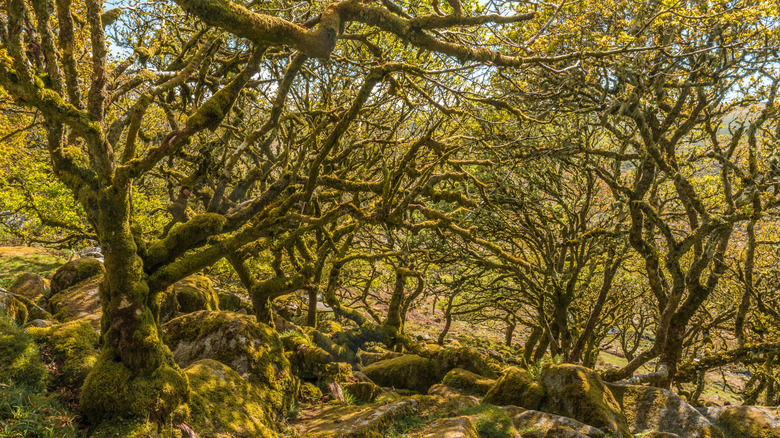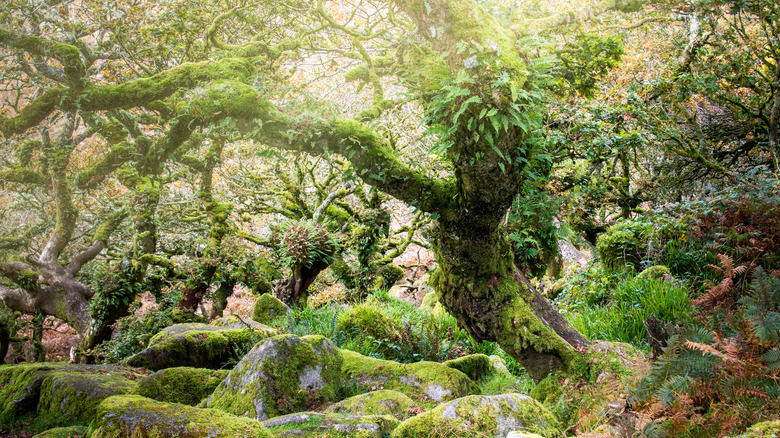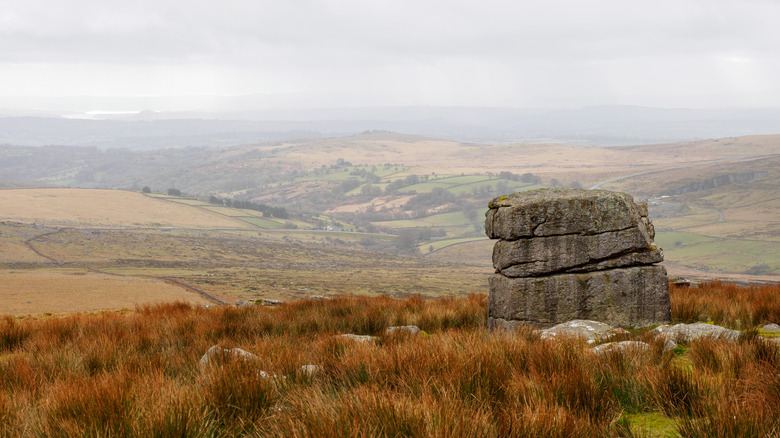One Of Britain's Oldest Forests Is In A National Park Steeped With Fantastical History
Twisted branches and tangled stumps scramble over and around gray boulders covered in moss and lichen. As the mist rolls off the moors and obscures the already-dark heart of the forest beyond the first row of dwarf oak trees, it is easy to see why Wistman's Wood has always been seen as a place of ancient druids, fairies, and hellhounds. This eerie spot in the middle of Dartmoor National Park in Devon is one of Britain's oldest surviving ancient temperate rainforests, full of centuries-old trees and an otherworldly atmosphere that is quite extraordinary.
Dartmoor National Park is also one of Britain's wildest spots. A vast expanse of bleakly beautiful open moorland gouged apart by deep river valleys and towering tors, it is instantly recognizable as an incredibly popular United Kingdom film location. Its size and relative inaccessibility have helped it remain largely untouched by the modern world and you can feel the magic and mystery of the British Isles still living here.
Wistman's Wood is one of the last remaining parts of Dartmoor Forest, which spread across the entire area over 9,000 years ago. This forest began to be cleared when Mesolithic hunters and settlers arrived around 5,000 BC. While the trees themselves are not quite this old, some specimens are thought to be at least between 400 and 500 years old.
Mystical druids and ghostly hunters in Wistman's Wood
From the gnarled tree branches swathed in bearded lichen to the moss-covered boulders with their intricate, bizarre whorls and markings, the woods have a remarkable aura. At certain times of the day, when the sun is low in the sky, it almost feels like the place is pulsing with an emerald light. So, it is hardly surprising that Wistman's Wood comes with more than its fair share of myths, legends, and spooky stories, and it is even said to be one of the most haunted places in Great Britain.
Some tales claim that ancient druids planted the wood, hence the name Wisht Man's Wood or Wise Man's Wood. It is also supposedly one of the main hunting grounds of the Devon Wild Hunt, a mythological hunting party of ghostly huntsmen and hounds that roam the moors on stormy nights.
Sir Arthur Conan Doyle is even believed to have used Wistman's Wood as the inspiration for his epic Sherlock Holmes story, "The Hound of the Baskervilles." Inspired by a visit to the woods, as well as by tales of the Wild Hunt, the author sent Holmes to Dartmoor on the search for a murderous hellhound as a result.
Ancient oak trees and panoramic views in Wistman's Wood
Beyond its creepy folklore and uncanny atmosphere, Wistman's Wood makes for a truly stunning and significant place to visit. As one of the highest remaining oakwoods in Britain it was designated as a Site of Special Scientific Interest in the 1960s, and it is a hugely important element of the overall biodiversity and conservation designation of Dartmoor itself. The most interesting and exciting element of the woods is its dwarf oaks — tiny, twisted, and even sometimes horizontal trees — the tallest of which barely tops 20 feet. The branches and trunks of these curious trees are covered with moss and garlanded with bilberry and hanging lichens, while the forest floor is carpeted with wild sorrel and bracken, the perfect hiding place for the wood's large community of adders.
Wistman's Wood is best explored by foot and there is a delightful waymarked trail that takes you on a gentle loop from the car park at the nearby Two Bridges Hotel. This charming walk encompasses the West Dart River, boasting some of the region's most breathtaking vistas over Dartmoor from Longaford Tor and Crockern Tor, as well as the witchy, weird, and wonderful wood itself.
If you are visiting Wistman's Wood, the Two Bridges Hotel is an excellent place to stay. An 18th-century coaching inn, it offers comfortable rooms and excellent food in a historic setting. An overnight stay on Dartmoor is well worth experiencing, offering the chance to immerse yourself in one of the last true wildernesses left in Britain.


